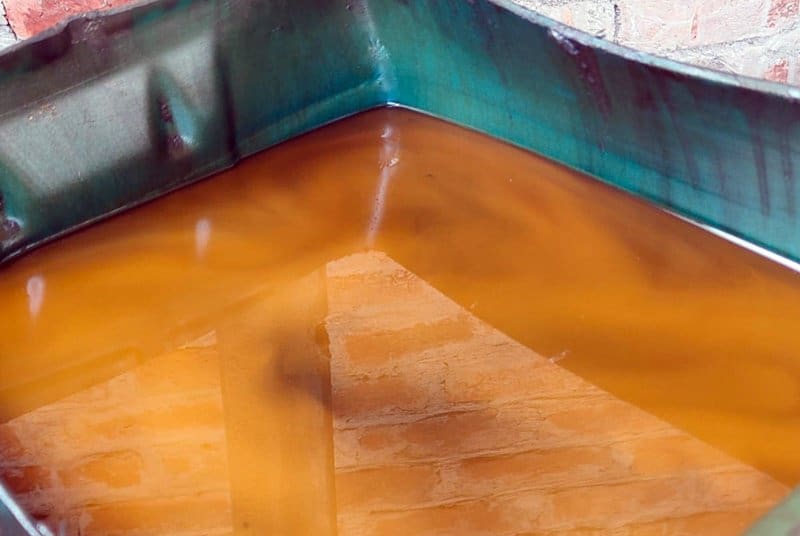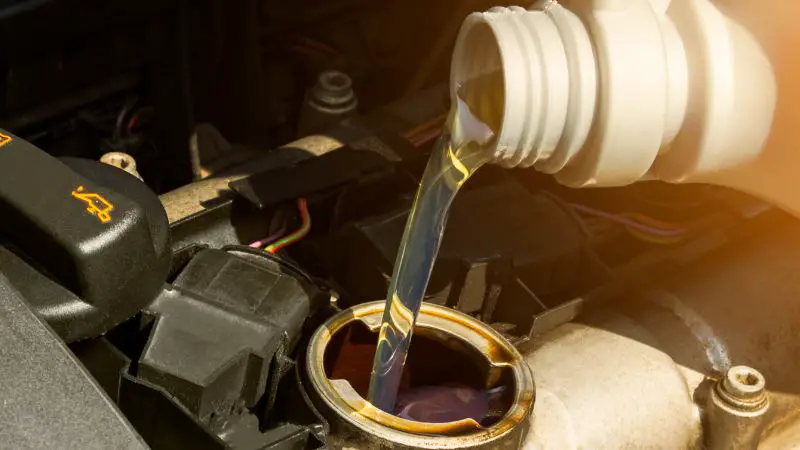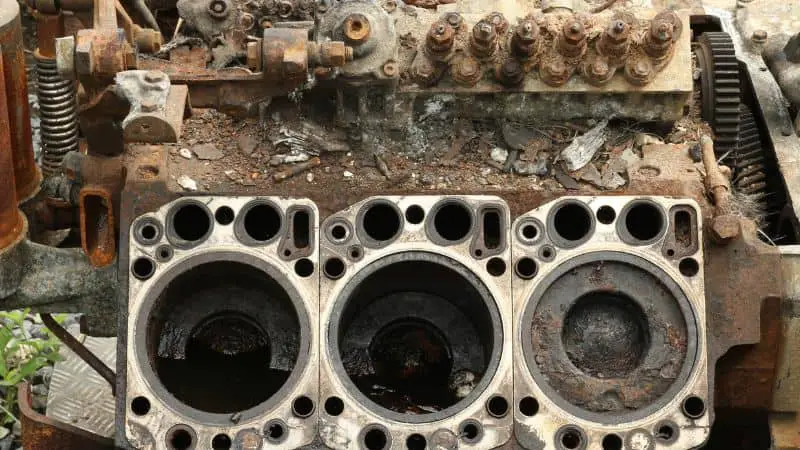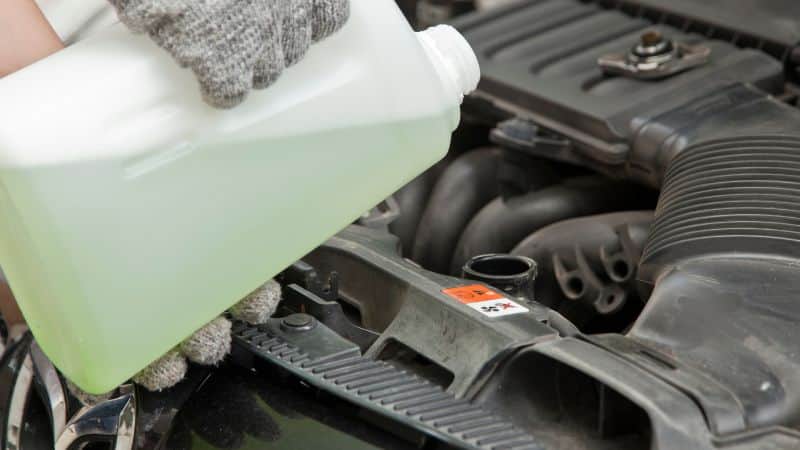Two engine fluids need to be carefully monitored over time to run your engine efficiently. These are engine oil and coolant. Each works for its purpose, so they are pumped separately into an engine.
Coolant flows through a hose system when oil travels through a valve series. But what happens if I accidentally put coolant in engine oil? It will be dangerous to your car’s overall health. To learn more about this topic, please read attentively.
What is Coolant?
Coolant Produced from a mixture of glycol and water, it can cool your engine when your car engine gets too hot. Even so, when your engine becomes cold, coolant prevents it from freezing. And so that another name for coolant is antifreeze. But there are some differences between these.
You can check: Coolant VS Antifreeze
What is Engine Oil?
Made from other blends, engine oil is made up of base oil and additives. This lubricant is responsible for greasing the engine’s internal parts to decrease friction. And it is also responsible for cleaning them. In The Different Types of Oil, HSO explains the differences between traditional, high-mileage, and synthetic engine oils.
Coolant In Engine Oil Symptoms
Engine oil mixing with coolant indicates an engine failure or blown head gasket. Additionally, this affects the viscosity and other important characteristics of your oil.
As a result, it reduces lubricity and engine power which can cause engine damage. Below are some symptoms to determine the presence of coolant in your oil.
Creamy Coffee Color
If coolant enters your oil pan, it leaves a red, orange, green, or brown mixture in the crankcase. While driving, coolant, and oil mix, resulting in a creamy composition. This will clog your engine channels. Therefore, lifting your dipstick and finding a creamy coffee color indicates a coolant-oil combination.

Coolant Loss
If there are steady drops in the coolant level but no leaks, it’s likely leaking at the coolant head gasket. Or the cylinder head is cracked, or the coolant is leaking into the oil pan.
Thus, if you see regular coolant loss, inspect for a leak. When no coolant leaks are found, you will check the oil level by oil dipstick to determine if coolant is entering the crankcase.
Sweet Smell
Adequately, if you notice a coolant leak doesn’t drip under the car, it loses its way into the oil pan. Coolant dissolved in the oil gives off a pleasant sweet smell.
Another trick to determine if coolant and oil have mixed is to remove the dipstick and smell it. Even a little coolant in the oil makes a particularly sweet smell.
What will happen, if you put coolant instead of oil?
Well, It’s depending on how much coolant you have and how you start the engine. Nothing happens until you pull the car into a garage And change the oil immediately without starting the engine.
If you pour too much coolant into the engine oil and try to start the car can cause some costly damage.
If it runs and you only drive it for a minute or two. But you need to change the oil right away. Coolant eats bearings; you will need a new engine when bearings fail. Even so, it doesn’t take long for the engine to fail.
What Happens If You Accidentally Put a Small Amount Of Oil In Coolant?
Oil in the coolant won’t kill the car. It’s something that can happen with a bad head gasket. However, it is not a desirable state. Remember, engine coolant is toxic and should be disposed of properly. One main problem you want to avoid with your car is mixing the oil with your engine coolant.
If you put an accidentally small amount of oil in coolant, this can cause slight damage to your car. But if you find this happening, you should address it immediately.

Coolant Mixing With Engine Oil
This section will teach you why oil mixes with coolant and what causes it. Have a look at the most common reasons for coolant mixing with engine oil and solution:
Blown Head Gasket
A blown head gasket is one of the most common causes of coolant mixing with oil. Ideally, coolant and oil flow to different engine parts without interfering with each other. In addition, the head gasket seals coolant from entering the oil pan.
Solution:
You should need to replace a blown head gasket, but it can be expensive. A blown head gasket will easily cost at least $1000-$2000 to fix. Fortunately, you can use a temporary solution for this problem while you have the money to replace this head gasket.
Cracked Oil Cooler
Your car’s oil cooler keeps oil and cooler in different compartments. But if there is a crack in the oil cooler, it can mix the coolant with oil.
Solution:
Accordingly, if you determine that you have a faulty oil cooler, you will need to replace it. Luckily, if you have the experience, you can replace the oil cooler using 12mm hex and pliers.
Flush the coolant several times before replacing the cooler to flush the coolant-blended oil out of the system. Once you get it out of the system, change the oil cooler, and you’re back on the road.
Damaged Engine Block
If you have oil mixed with antifreeze, it may be due to a damaged engine block. Fortunately, it is not common for engine blocks to crack because they tend to be resilient.
But if a damaged engine block creates a problem, that’s what you must worry about the most. Because replacing engine blocks can be expensive and will burn a hole in your wallet.

Solution:
Please take it to a mechanic and have your engine block checked for damage. In particular, if it has a crank, replacing it is a good idea. Depending on your vehicle, replacing this engine block can cost between $4000 and $10,000.
Oil in Coolant but no Coolant in Oil
Oil can leak into the cooling system, but coolant will still leak into the oil simultaneously. For example, if an oil cooler inside your radiator starts to leak, you will find oil in the coolant. But there doesn’t need to be any coolant in the oil.
At first, there may be no other symptoms. This warrants further investigation, as oil is getting into your cooling system. Furthermore, it needs to be fixed very quickly. If you avoid it long enough, it can leak coolant into the oil or leak externally.
Oil In The Coolant Reservoir, But The Car not Overheating?
Do you notice your car’s temperature gauge is not rising? It could be because there is too much oil in the coolant reservoir. If you’ve seen this, you’re not alone. For different reasons, it will happen. The reasons are leaky oil into the radiator, Mixing oil and coolant, or overfilling the overflow tank.
Unfortunately, it would be a head gasket or a timing cover gasket, even though the car is not overheating. You can take your car mechanic to get a proper solution if there is none.
FAQ (Frequently Asked Questions):
Q. Why is oil mixed with coolant, and what are the causes?
A common cause of oil mixing with coolant is the head gasket. Mainly, this thin metal sheet sits between the cylinder block and engine block, creating a liquid-tight and air-tight seal. If this fails, the coolant and oil may mix. In some cases, the coolant can enter the oil.
Q. How Long Can You Drive With Coolant In The Oil?
Yes, you can. For as long as possible, in fact, without any problems. That, of course, is to assume that whatever has been mixed in them has been repaired.
Technically speaking, your cooling capacity will be drastically reduced depending on how much oil there is. But its existence should be fine for the rest of the engines.
Oil in the coolant? It’s not very worrying, because overall it’s not very harmful. But the oil in the coolant? This is massively bad. You see, coolant creates a relatively poor lubricant compared to oil.
Q. How do you remove coolant from oil?
In this case, get yourself a drain pan, and remove the sump plus. Now let the coolant drain until you see only engine oil coming out for a few seconds. Replace the plug above the oil level – this time with the oil! and run it for a day or more.
Q. If accidentally put a small amount of oil in the coolant, what happens?
No worries. If it is a really small amount like a drop. You also make it out by pouring more amount of coolant. Because when you add more coolant or water, then oil drops will come in the top surface and you will able to easily make it out from the coolant surface.
Q. What Should I Do, If accidentally put water in engine oil?
You should immediately Change all the oil from the engine. And also check the oil filter, if you see any sign of water or foaming then you should also replace the Oil filter. It is better for your change if you flush your engine with 1/3 oil and run like 200-300 miles and change the oil again.

Final Word
In short, if you accidentally put coolant in engine oil but don’t start the engine, just remove all of it. Using anything from a pump sucks up all the oil you can. Since it’s lighter than water, it should float on top of the coolant. Once the engine is running, some oil may circulate and not be reached.
But go ahead and wipe off any oil possible. At the bottom of the radiator is a “stopcock,” or valve. If you completely drain, fill, and drain the radiator a few times, most of the oil should wash out.
Then, when you think most of the oil is gone, just go to a nearby garage and explain what happened. They can do a reverse flush under pressure, hopefully removing all contaminants.
Read Also: How Much Coolant Do I Need For My Car

